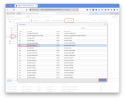Alright long story short I have been in SMB H*ll on my homelab for the last 8 or nine months. I have exhausted youtube and google trying to find the correct way to use SMBS in proxmox.
Currently I have been creating a folder in /mnt and using a command to mount it in shell. This seems to work for a bit then it dosnt, or if the power goes out all the shares unmount.
I have posted here a couple times and no one has been willing to help me so far.
I would like someone to help me get my SMBS set up CORRECTLY and reboot / power loss proof. Last time I posted someone helped me add the SMB to the proxmox gui, but that was as far as i got.
My setup is currently a Open media vault VM hosting multiple SMBS as a centralized storage ---> to a bunch of privileged containers such as plex and my ARR stack.
Issue currently by editing fstab is it doesn't survive a reboot if the power goes out, some containers don't seem to want to write to the SMB'S, and sometimes the mount points seem messed up and the CT's don't seem to see the inner folders on the SMB.
I am desperate to get this fixed for once and for all, but all the tutorials i seem to find have varying ideas on how to do this in different levels of complexity. I need to be able to use the SMB's without having to rebuild the cts from scratch as family members are using some of them such as plex, and resetting all that up is not something they will do on the end user end.
Really hoping soemone is charitable enough to help a guy out here.
Thank you
Currently I have been creating a folder in /mnt and using a command to mount it in shell. This seems to work for a bit then it dosnt, or if the power goes out all the shares unmount.
I have posted here a couple times and no one has been willing to help me so far.
I would like someone to help me get my SMBS set up CORRECTLY and reboot / power loss proof. Last time I posted someone helped me add the SMB to the proxmox gui, but that was as far as i got.
My setup is currently a Open media vault VM hosting multiple SMBS as a centralized storage ---> to a bunch of privileged containers such as plex and my ARR stack.
Issue currently by editing fstab is it doesn't survive a reboot if the power goes out, some containers don't seem to want to write to the SMB'S, and sometimes the mount points seem messed up and the CT's don't seem to see the inner folders on the SMB.
I am desperate to get this fixed for once and for all, but all the tutorials i seem to find have varying ideas on how to do this in different levels of complexity. I need to be able to use the SMB's without having to rebuild the cts from scratch as family members are using some of them such as plex, and resetting all that up is not something they will do on the end user end.
Really hoping soemone is charitable enough to help a guy out here.
Thank you


